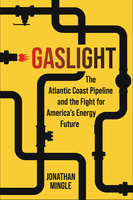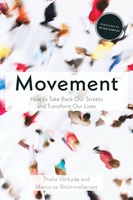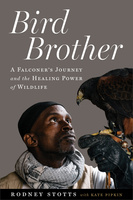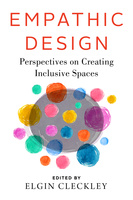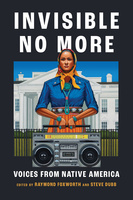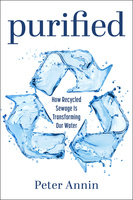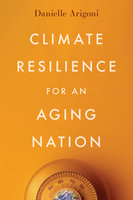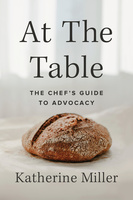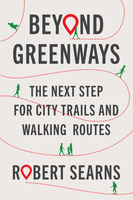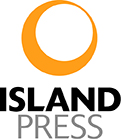
Island Press began with a simple idea: knowledge is power—the power to imagine a better future and find ways for getting us there. Founded in 1984, Island Press’ mission is to provide the best ideas and information to those seeking to understand and protect the environment and create solutions to its complex problems.
Climate Action for Busy People
Killed by a Traffic Engineer
Shattering the Delusion that Science Underlies our Transportation System
Fixing the carnage on our roadways requires a change in mindset and a dramatic transformation of transportation. This goes for traffic engineers in particular because they are still the ones in charge of our streets.
In Killed by a Traffic Engineer, civil engineering professor Wes Marshall shines a spotlight on how little science there is behind the way that our streets are engineered, which leaves safety as an afterthought. While traffic engineers are not trying to cause deliberate harm to anyone, he explains, they are guilty of creating a transportation system whose designs remain largely based on plausible, but unproven, conjecture.
Killed by a Traffic Engineer is ultimately hopeful about what is possible once we shift our thinking and demand streets engineered for the safety of people, both outside and inside of cars. It will make you look at your city and streets—and traffic engineers—in a new light and inspire you to take action.
Bicycle City
Riding the Bike Boom to a Brighter Future
Piatkowski offers pragmatic lessons drawn from the latest research along with interviews, anecdotes, and case studies from around the world. Electric bikes are demonstrating the ability of bikes to replace cars in more places and for more people. Cargo bikes are replacing SUVs for families and delivery trucks for freight. At the same time, mobility startups are providing new ownership models to make these new bikes easier to use and own, ushering in a new era of pedal-powered cities.
Bicycle City is about making cities better with bikes rather than for bikes.
When Driving Is Not an Option
Steering Away from Car Dependency
One third of people living in the United States do not have a driver license. Because the majority of involuntary nondrivers are disabled, lower income, unhoused, formerly incarcerated, undocumented immigrants, kids, young people, and the elderly, they are largely invisible.
In When Driving is Not an Option disability advocate Anna Letitia Zivarts draws from interviews with involuntary nondrivers from around the US and from her own experience, to shine a light on the number of people in the US who cannot drive and outline actions to improve our mobility systems.
When the needs of involuntary nondrivers are viewed as essential to how we design our transportation systems and our communities, not only will we be able to more easily get where we need to go, but the changes will lead to healthier, climate-friendly communities for everyone.
Gaslight
The Atlantic Coast Pipeline and the Fight for America's Energy Future
Their struggle took them all the way to the Supreme Court, but their larger fight was in the court of public opinion. Would the nation swallow the industry’s narrative that gas was “a bridge fuel” to a clean, green future? Or would the public recognize it as a methane bomb, capable of not only wrecking local communities but imperiling the planet? Vivid and suspenseful, Gaslight is essential reading for anyone who wants to understand the urgent stakes of the energy choices we face today.
Movement
How to Take Back Our Streets and Transform Our Lives
Making our communities safer, cleaner, and greener starts with asking these fundamental questions: who do our streets belong to, how do we want to use them, and who gets to decide? To truly transform mobility, we need to look far beyond the technical aspects and put people at the center of urban design. Movement will change the way that you view our streets.
Making Climate Tech Work
Policies that Drive Innovation
Bird Brother
A Falconer's Journey and the Healing Power of Wildlife
Barons
Money, Power, and the Corruption of America's Food Industry
“In this eye-opening debut study, Frerick, an agricultural policy fellow at Yale University, reveals the ill-gained stranglehold that a handful of companies have on America’s food economy…It’s a disquieting critique of private monopolization of public necessities.” - Publishers Weekly, starred
Barons is the story of seven titans of the food industry, their rise to power, and the consequences for workers, eaters, and democracy itself. Readers will meet a secretive German family that took over the global coffee industry in less than a decade, relying on wealth traced back to the Nazis to gobble up countless independent roasters. They will visit the Disneyland of agriculture, where school children ride trams through mechanized warehouses filled with tens of thousands of cows that never see the light of day. And they will learn that in the food business, crime really does pay—especially when you can bribe and then double-cross the president of Brazil. Barons paints a stark portrait of corporate consolidation, but it also shows that a fair, healthy, and prosperous food industry is possible—if we take back power from the barons who have robbed us of it.
Human Transit, Revised Edition
How Clearer Thinking about Public Transit Can Enrich Our Communities and Our Lives
The first edition of Human Transit, published in 2011, has become a classic for professionals, advocates, and interested citizens.
Walker has updated and expanded the book to deepen its explanations. New topics include the problem with specialization; the role of flexible or “demand response” services; how to know when to redesign your network; and responding to tech-industry claims that transit will soon be obsolete. Finally, he has also added a major new section exploring the idea of access to opportunity as a core measure of transit’s success.
No other book explains the basic principles of public transit in such lively and accessible prose, all based on a respect for your right to form your own opinion. Walker’s goal is not to make you share his values, but to give you the tools to clarify and advocate for yours.
Empathic Design
Perspectives on Creating Inclusive Spaces
How do you experience a public space? Do you feel safe? Seen? Represented? The response to these questions may differ based on factors including your race, age, ethnicity, or gender identity. In Empathic Design, designer and architecture professor Elgin Cleckley brings together leaders and visionaries in architecture, urban design, planning, and design activism to explore what it means to design with empathy. Empathic designers work with and in the communities affected. They acknowledge the full history of a place and approach the lived experience and memories of those in the community with respect.
Contributors explore broader conceptual approaches and highlight design projects including the Harriet Tubman Memorial in Newark, which replaced a long-standing statue of Christopher Columbus; and restoration of the Freedom Center in Oklahoma City, first built by civil activist Clara Luper to provide a safe place for gathering and youth education; and The Camp Barker Memorial in Washington, D.C., which commemorates a “contraband camp” used to house former slaves who had been captured by the Union Army.
Empathic Design provides essential approaches and methods from multiple perspectives, meeting the needs of our time and holding space for readers to find themselves.
Invisible No More
Voices from Native America
Edited by Raymond Foxworth of the Henry Luce Foundation and Steve Dubb of The Nonprofit Quarterly, Invisible No More is a groundbreaking collection of stories by Native American leaders, many of them women, who are leading the way through cultural grounding and nation-building in the areas of community, environmental justice, and economic justice. While telling their stories, authors excavate the history and ongoing effects of genocide and colonialism, reminding readers how philanthropic wealth often stems from the theft of Native land and resources, as well as how major national parks such as Yosemite were “conserved” by forcibly expelling Native residents. At the same time, the authors detail ways that readers might imagine the world differently, presenting stories of Native community building that offer benefits for all.
People, Planet, Design
A Practical Guide to Realizing Architecture’s Potential
In People, Planet, Design, architect Corey Squire builds the case, provides the data, and lays out the practical tools for human-centered architecture. This approach integrates beauty and delight with an awareness of every design choice’s impact. Outcome-focused with a deep dive into practical strategies, the book showcases ten building systems that embody design excellence.
Essential reading for architects who want to transform what the profession means, People, Planet, Design pioneers a new vision and sets readers up with clear guidance for implementation.
Purified
How Recycled Sewage Is Transforming Our Water
Purified’s fast-paced narrative cuts through the fearmongering and misinformation to make the case that recycled water is direly needed in the climate-change era. Water cannot be taken for granted anymore—and that includes sewage.
Over the Seawall
Tsunamis, Cyclones, Drought, and the Delusion of Controlling Nature
In March 2011, people in a coastal Japanese city stood atop a seawall watching the approach of the tsunami that would kill them. They believed—naively—that the huge concrete barrier would save them. Instead, they perished, betrayed by the very thing built to protect them.
Academics call it maladaptation; in simple terms, it’s about solutions that backfire. Over the Seawall tells the stories behind these unintended consequences and the fixes that do more harm than good. From seawalls in coastal Japan, to reengineered waters in the Ganges River Delta, to the ribbon of water supporting both farms and cities in parched Arizona, we visit engineering marvels once deemed too smart and too big to fail. After each we better understand how complicated, grandiose schemes fail. Ultimately, we learn that if we are to adapt successfully to climate change, we must recognize that working with nature is not surrender but the only way to assure a secure future.
Climate Resilience for an Aging Nation
Arigoni explores how to integrate age-friendly resilience into community planning and disaster preparedness efforts through new planning approaches. These include an age-friendly process, and a planning framework dedicated to inclusive disaster recovery.
Climate Resilience for an Aging Nation will help professionals and concerned citizens understand how to best plan for both the aging of our population and the climate changes underway to create communities that serve the needs of older adults better, not only during disasters but for all the days in between.
At the Table
The Chef's Guide to Advocacy
In At the Table, Miller presents the essential techniques she developed for the James Beard Foundation’s Chefs Boot Camp for Policy and Change. Readers will learn how to focus their philanthropic efforts; pinpoint their audience and develop their argument; recruit allies and support action; and maybe most importantly, grab people’s attention in a crowded media landscape. You don’t have to be a celebrity chef to change the food system; you just need the will and the tools in this unique guide.
Beyond Greenways
The Next Step for City Trails and Walking Routes
Searns introduces two models—grand loop trails and town walks. Grand loop trails are 20 to 350-mile systems that encircle metro areas. Town walks are shorter—2 to 6-mile routes in cities. He then lays out how to plan, design, and build support for them, drawing inspiration from trails in the US and abroad.
Planners, trail advocates, and community leaders will find the tools here to develop successful and affordable trails. Now is the time to pursue accessible pedestrian routes for this, and future, generations.
Hazardous Seas
A Sociotechnical Framework for Early Tsunami Detection and Warning
Hazardous Seas, edited by disaster preparedness experts Louise K. Comfort and Harkunti P. Rahayu, is an invaluable guide for policy makers and international NGOs looking to save lives from tsunamis and mitigate crippling damage to communities. It also provides a comprehensive overview of tsunami detection and warning for students of engineering, computer science, planning, policy, and economic and environmental analysis.
Inclusive Transportation
A Manifesto for Repairing Divided Communities
Davis aims to disrupt the status quo of the transportation industry. She urges transportation professionals to reflect on past injustices and elevate current practice to do the hard work that results in more than an idea and a catchphrase.
Inclusive Transportation is a call to action and a practical approach to shaping communities based on principles of justice and equity.





